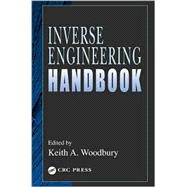
Note: Supplemental materials are not guaranteed with Rental or Used book purchases.
Purchase Benefits
Looking to rent a book? Rent Inverse Engineering Handbook [ISBN: 9780849308611] for the semester, quarter, and short term or search our site for other textbooks by Woodbury; Keith A.. Renting a textbook can save you up to 90% from the cost of buying.
| SEQUENTIAL METHODS IN PARAMETER ESTIMATION | |
| James V. Beck, Professor Emeritus, Michigan State University, USA | |
| Abstract | |
| Introduction | |
| Parameter vs. Function Estimation | |
| Common Research Paradigms in Heat Transfer | |
| Sequential Estimation over Experiments for Linear Problems | |
| Ill-Posed Problems: Tikhonov Regularization | |
| Matrix Form of Taylor Series Expansion | |
| Gauss Method of Minimization for Nonlinear Estimation Problems | |
| Confidence Regions | |
| Optimal Experiments | |
| Summary | |
| References | |
| SEQUENTIAL FUNCTION SPECIFICATION METHOD USING FUTURE TIMES FOR FUNCTION ESTIMATION | |
| Keith A. Woodbury, The University of Alabama, USA | |
| Abstract | |
| Nomenclature | |
| Introduction | |
| Linear Problems | |
| Nonlinear Problems | |
| Summary | |
| References | |
| THE ADJOINT METHOD TO COMPUTE THE NUMERICAL SOLUTIONS OF INVERSE PROBLEMS | |
| Yvon Jarny, Ecole Polytechnique de L'UniversitT de Nantes, France | |
| Introduction | |
| Modelling Equations | |
| Least Squares and Gradient Algorithms | |
| Lagrange Multipliers | |
| The Adjoint Method | |
| The Adjoint Method to Minimize the LS-Criterion with Algebraic Modelling Equations | |
| The Adjoint Method to Minimize the LS-Criterion with Integral Modelling Equation | |
| Adjoint Method to Minimize LS-Criteria with Ordinary Differential Equations as Constraints | |
| Adjoint Method to Minimize LS-Criteria with Partial Differential Equations as Constraints | |
| Conclusion and Summary | |
| References | |
| MOLLIFICATION AND SPACE MARCHING | |
| Diego A. Murio, University of Cincinnati, USA | |
| Mollification In R1 | |
| Data Smoothing | |
| Identification of Parameters in 1-D IHCP | |
| Discrete Mollification in R2 | |
| References | |
| INVERSE HEAT CONDUCTION USING MONTE CARLO METHOD | |
| A. Haji-Sheikh, University of Texas at Arlington, USA | |
| Introduction | |
| Introduction to Monte Carlo Method | |
| Random Walks in Direct Monte Carlo Simulation | |
| Monte Carlo Method for Inverse Heat Conduction | |
| Conclusion | |
| Nomenclature | |
| References | |
| CORRELATED DATA AND STOCHASTIC PROCESSES | |
| Ashley Emery, University of Washington, USA | |
| Introduction | |
| Correlation and Its Effect on Precision | |
| Least Squares Estimation and Linearization | |
| Determination of se | |
| Ergodic and Stationary Processes | |
| Uncertain Parameters | |
| Bayesian Probabilities, Prior Information, and Uncertain Parameters | |
| Conclusions | |
| OPTIMAL EXPERIMENT DESIGN | |
| Aleksey V. Nenarokomov, Moscow State Aviation Institute, Russia | |
| Introduction | |
| Brief Historical Analysis of Background and Survey | |
| Experiment Design Problem Statement | |
| Iterative Method of Optimal Design of Thermosensors Installation and Time of Signals Readings | |
| Experiment Design for Lumped Parameter Systems | |
| Conclusions | |
| References | |
| BOUNDARY ELEMENT TECHNIQUES FOR INVERSE PROBLEMS | |
| Thomas J. Martin, Pratt & Whitney Engine Company and George S. Dulikravich, University of Texas at Arlington, USA | |
| Introduction | |
| Inverse Heat Conduction | |
| Ill-Posed Boundary Conditions in Fluid Flow | |
| Ill-Posed Surface Tractions and Deformations in Elastostatics | |
| Inverse Detection of Sources | |
| Transient Problems | |
| References |
The New copy of this book will include any supplemental materials advertised. Please check the title of the book to determine if it should include any access cards, study guides, lab manuals, CDs, etc.
The Used, Rental and eBook copies of this book are not guaranteed to include any supplemental materials. Typically, only the book itself is included. This is true even if the title states it includes any access cards, study guides, lab manuals, CDs, etc.